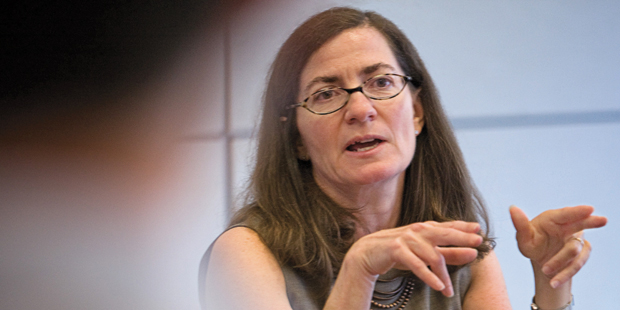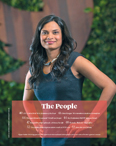Consumer Guardian
Law Women’s 2014 Alumna of the Year zealously protects the American public.
Printer Friendly VersionWhen Julie Brill first became a commissioner for the Federal Trade Commission in 2010, her job was a mystery to her neighbors. “They’d say, ‘Oh, are you involved in international trade? Do you negotiate treaties?’” says Brill ’85.
“People don’t realize that what we do is consumer protection, competition, and enforcement,” Brill explains. As both a consumer watchdog and a barometer for market trends, the FTC, she says, “follows what’s happening to consumers, which is directly related to what’s happening in the economy.”
It’s a perfect position for Brill, who chose law over economics in order to realize her dream of shaping public policy. As she recounted when receiving the Law Women Alumna of the Year Award in February, Brill was inspired by Louis Brandeis, whose championship of local causes won him a national reputation, and she espouses a Yiddish proverb: “God created a world full of small worlds.”
“I found my small world in Vermont,” Brill says, having landed there after law school by clerking for Judge Franklin Billings Jr. of the US District Court for the District of Vermont. After a brief stint at Paul, Weiss, Rifkind, Wharton & Garrison to strengthen her practical experience, she returned to Vermont to work in the state attorney general’s office. “State AGs usually have relatively few attorneys compared to federal agencies, but they have a much broader mandate,” she explains, which gave her the chance to have a lot of responsibility early in her career.
Soon after joining Vermont’s Consumer Protection Unit, Brill was blitzed with complaints from people who were being rejected for mortgages and refinancing. The local issue—how big errors by big companies affected people in small towns—led to testimony before Congress and ultimately to substantial revisions in the Fair Credit Reporting Act.
That experience, in turn, took Brill to North Carolina, to head up the AG’s Consumer Protection Division and, from there, to her FTC appointment.
In 2010 the country was still reeling from the financial crisis, so much of Brill’s focus early on as commissioner was on what she calls “last-time frauds”—scams targeting people who have lost their jobs, are in danger of foreclosure, and, consequently, are susceptible to fraudulent claims of relief.
As the economy has started to improve and these kinds of frauds have slowed, Brill is turning to other issues. Paramount among them is parsing the privacy implications of emerging technologies: specifically, big data analytics (how personal data is gathered and used) and its effect on consumer privacy (think not only Target’s credit card security breach but also using personal data to influence decisions on health insurance coverage and loan approvals). Brill, who earlier this year was interviewed on 60 Minutes, is right in the thick of the conversation. Last year she launched Reclaim Your Name, a comprehensive initiative that would give consumers the knowledge and technological tools to reassert some control over their personal data.
In addition to privacy issues and consumer protection, Brill would like to see the FTC continue its focus on competition in health care. Citing a 2013 Supreme Court decision against the practice of pharmaceutical brands signing agreements with generic drug makers to delay the entry of those lower-cost brands, she says: “Moving forward, I want to see that what the Supreme Court said gets implemented in the lower courts and in the industry.”
An accomplished public speaker, Brill gives talks about privacy issues and big data several times a month. She relishes the pulpit the FTC provides to communicate complicated issues to the public and explain how these issues—and the FTC’s rulings—affect their lives. In her speech accepting the alumna award, Brill quoted “that sage of the workplace, Ferris Bueller”: “Life moves pretty fast. If you don’t stop and look around once in a while, you could miss it.” It’s advice that she admits she doesn’t always follow herself.
But she’s not complaining. “Like every job, there are times you tear your hair out,” says Brill. “But most of the time, I feel like I’m eating strawberries and drinking champagne. I can’t believe I’m so privileged to do what I get to do.”
—

